It has long been suggested that the geeks would one day inherit the Earth, and this week saw a significant victory in that particular battle.
US sitcom The Big Bang Theory – the tale of a group of friends and lovers in the California scientific community – was a hit from the first series. But recent years have seen it take over network TV in spectacular terms. With a weekly audience of 21.3 million in the US alone, The Big Bang Theory currently makes a lot of people a lot of money in advertising revenue and syndication, including its stars, who can accurately claim to be the highest-paid people on television.
With production due to start on a new series last week, Johnny Galecki, Jim Parsons and Kaley Cuoco hadn’t signed new contracts: they drove a hard bargain, effectively holding CBS to ransom. After a negotiation stand-off was resolved this week, they’re now expected to earn $1m for each of the 72 episodes due over the next three years. Factoring in ownership clauses, production deals and bonus advances, the trio are looking at raking in $90m each. There is a precedent for this: in 2010, Charlie Sheen was earning $1.8m per episode of Two and a Half Men. The Friends cast were making $1m each per episode in its final season.
In fact, the industry term for when stars see their pay packets rise this astronomically is “Friends money”. The similarities with the 90s behemoth don’t end there – it is the Friends of this generation. With wall-to-wall repeats across Channel 4 and E4, it has reached that familiar point we got to with the Central Perk crew where you end up watching episodes three or four times and still find them funny.
Before the final negotiations, the show’s creator Chuck Lorre told E! News: “Everybody should be very successful and happy and rich. They earned it. It’s a great cast. It’s their time.”
Launched in 2007, the show centres on two physicists sharing an apartment in Pasadena; the socially awkward Leonard (Galecki) and the neurotic, borderline sociopathic Sheldon (Parsons). Their lives are turned upside down when Penny (Cuoco), a farmgirl and struggling actor with the street smarts they lack, moves in across the hall, and a classic sitcom dynamic is born. On UK screens, while plenty of critics initially dismissed it as US trash TV, it has become one of the most beloved shows on British TV.
In an age of high-concept US comedy – such as Modern Family with its mock-doc format, or 30 Rock’s meta in-jokes – Big Bang became the people’s choice through being old-fashioned. Although dripping in pop-culture references and broad sexual humour, it recalls a more nostalgic tradition: filmed on multiple cameras, in front of a studio audience. In the broadest sense, it is simply very, very funny, and is brimming with its own in-jokes and signature lines.
Fans all know that the correct term for sexual intercourse is “coitus”, the specific reasons why Sheldon only likes to sit in one special chair, and that there are few quarrels in life that can’t be solved by a good old game of Rock, Paper, Scissors, Lizard, Spock. We have watched Leonard and Penny’s charming on-off relationship as Sheldon slowly learns to tolerate it, while struggling to maintain a working knowledge of sarcasm. The show really hit its stride, though, with the expansion of the female cast. For this fan, the character of Amy Farrah Fowler, introduced as a love interest of sorts for Sheldon, is, by some chalk, the best character. Played by Mayim Bialik (the 90s teen star of Blossom, and a gifted neuroscientist herself), Amy is a lifelong wallflower in the throes of a sexual awakening, lusting after Sheldon.
Big Bang’s success can perhaps be attributed to a rising tide in geek culture. Dave Golder, former editor of cult bible SFX, certainly thinks so. “Like all good sitcoms, it reflects current trends,” he says. “I think one reason the show is so popular is that we’re all geeks now. The more cynical might say it exploits the recent boom in mainstream geekdom. Superhero movies, video games, laptop video calls – these are not niche activities any more. Of the three highest-grossing movies of all time, one is a sci-fi film, Avatar, and one is a comic-book adaptation, Marvel’s Avengers Assemble. Doctor Who is one of the most talked-about shows on TV, and one of the BBC’s most talked-about exports; this stuff is mainstream now. So, although on the surface the show may purport to be about a group of nerds with insular interests, in fact the jokes and situations mean it’s Friends for the 21st-century iPhone crowd.”
The show has done well from its geek credentials. Wil Wheaton, who played Wesley Crusher in Star Trek: The Next Generation makes regular ‑appearances as himself, while Professor Stephen Hawking, Leonard Nimoy (the original Spock) and Carrie Fisher (Princess Leia) have all had cameos.
But the central conceit, of socially awkward nerds constantly outsmarted by the women around them, has led to criticism from certain quarters for patronising the culture it purports to celebrate. “I think it does both,” says Bradley. “It sometimes aims for cheap laughs, as though a bunch of guys choosing to play Dungeons & Dragons, or a woman going into a comic shop are inherently funny situations – which they’re not, and it’s kind of insulting to suggest they are. On the other hand, the show affectionately references a great many aspects of geek culture, which is wonderful to see on screen. There’s a reason it has the ongoing endorsement of people like Wil Wheaton.”
Last year, CBS took the unprecedented step of renewing it for three more seasons all at once, which will take it close to the marathon runs of the most beloved of US sitcoms like Cheers, Frasier and, of course, Friends. As Dr Sheldon Cooper would say, “Bazinga!”
Five of the best Big Bang theories
On the complex rules of Rock, Paper, Scissors, Lizard, Spock
Sheldon: “Scissors cuts paper, paper covers rock, rock crushes lizard, lizard poisons Spock, Spock smashes scissors, scissors decapitates lizard, lizard eats paper, paper disproves Spock, Spock vaporises rock, and – as it always has – rock crushes scissors.”
On Raj finally getting a girlfriend
Raj: “We have to go over some ground rules about Emily.”
Howard: “Like, when it turns out she’s made of rubber, I don’t say anything?”
Raj: “She’s very real.”
Howard: “That’s what it says on the box. Right next to ‘dishwasher safe’.”
On self-esteem
Sheldon: “Why are you crying?”
Penny: “Because I’m stupid!”
Sheldon: “That’s no reason to cry. One cries because one is sad. For example, I cry because others are stupid, and that makes me sad.”
On dating
Leonard: “You’ll never guess what just happened.”
Sheldon: “You went out in the hallways, stumbled into an inter-dimensional portal, which brought you 5,000 years into the future, where you took advantage of advanced technology to build a time machine, and now you’re back, to bring us all with you to the year 7010, where we are transported to work at the think-a-torium by telepathically controlled flying dolphins?”
Leonard: “No … Penny kissed me.”
Sheldon: “Who would ever guess that?”
On ethics
Leonard: “You don’t go into science for the money.”
Bernadette: “Speak for yourself. Last month my company both invented and cured restless eye syndrome. Ka-ching, ya blinky chumps!”
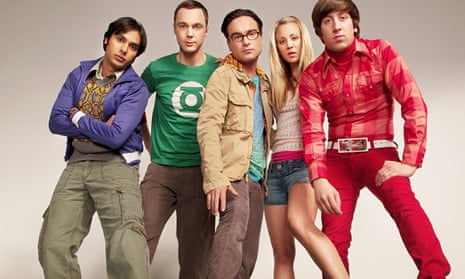
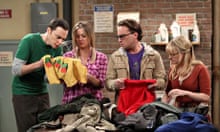
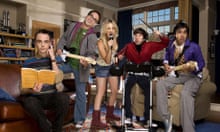
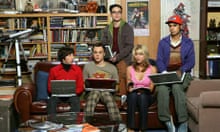
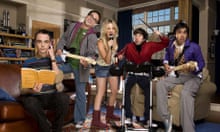
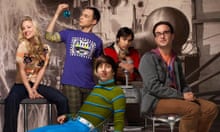
Comments (…)
Sign in or create your Guardian account to join the discussion